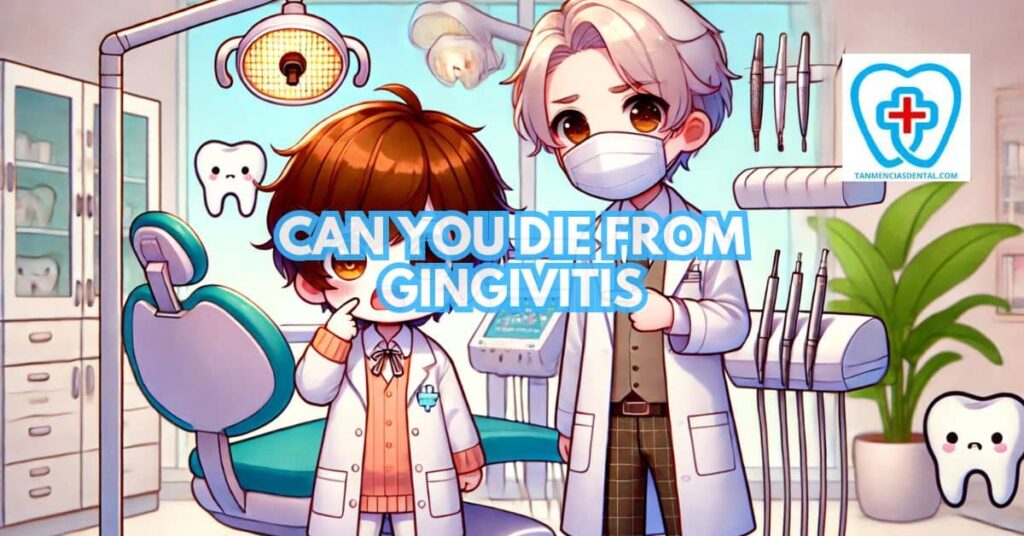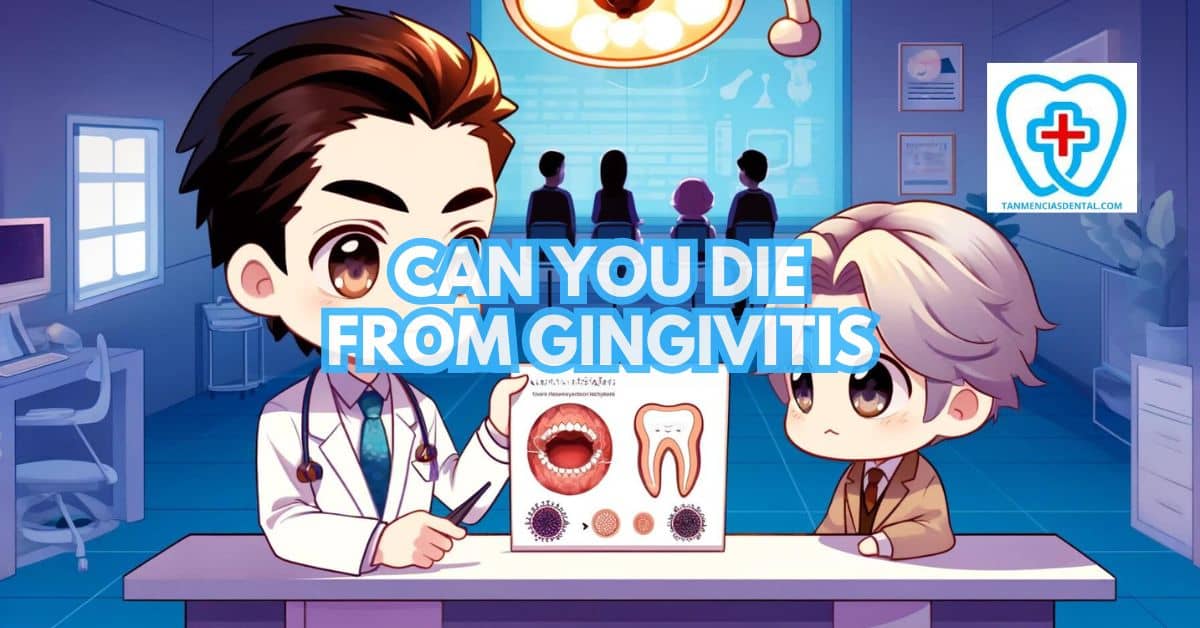Gingivitis, the earliest form of gum disease, causes red, swollen gums that may bleed when brushing.
While it might seem harmless, many wonder, can you die from gingivitis if left untreated?
Poor dental hygiene can cause gingivitis to progress into more severe conditions, potentially impacting not only the gums but also overall health.
In extreme cases, untreated gum disease has been linked to serious health problems, including infections that affect the heart and other organs.
Understanding the risks of neglected gum health can help prevent these severe outcomes and keep your mouth—and body—healthy.
1. Understanding Gingivitis: Not a Death Sentence
Gingivitis is a common form of gum disease that usually doesn’t threaten life when managed properly.
It happens when the gums become inflamed due to plaque, a sticky film of bacteria that builds up on the tooth surface.
If gingivitis is not treated early, it can lead to periodontal disease, a more severe infection that damages the tissues and bones supporting the teeth.
Periodontal disease can allow bacteria to enter the bloodstream, leading to infections in other parts of the body.
In rare cases, the spread of these infections can result in life-threatening complications, making people wonder if gum disease can kill.
Maintaining good oral hygiene, like brushing twice daily and flossing, is key to stopping gingivitis before it gets worse.
Regular dental checkups also help detect gum issues early, keeping both your teeth and overall health in check.
2. Gingivitis vs. Periodontitis: Knowing the Difference
Gingivitis and periodontitis are both types of gum disease, but they differ significantly in severity and impact on oral health.
Gingivitis is an early stage of gum disease marked by red, swollen gum tissue that may bleed easily, especially when you brush your teeth.
It can cause bad breath and discomfort, but it doesn’t yet harm the bones or connective tissues that support your teeth.
If gingivitis is left untreated, however, it can progress to periodontitis, a more advanced stage where gum tissue and the bone around teeth begin to break down.
This breakdown creates deep pockets between the gums and teeth, allowing bacteria to spread further and causing more damage.
Without proper treatment, periodontitis can lead to tooth loss and even affect overall health.
Regular brushing, flossing, and dental visits are essential to preventing gingivitis and stopping it from developing into periodontitis.
🦷 Immediate Relief for Toothaches in Marikina: A Guide to Emergency Dental Care Services
3. The Link Between Gum Disease and Overall Health
Gum disease, marked by gum inflammation and infection, affects more than just your mouth—it’s closely linked to various serious health conditions.
When gums become inflamed, harmful bacteria can enter the bloodstream, potentially impacting other organs and increasing the risk of heart disease, diabetes, and even strokes.
For people who already have these health conditions, untreated gum disease can worsen their symptoms or make management more difficult.
Studies show that the inflammation in the gums may trigger body-wide inflammatory responses, which can strain the heart and blood vessels.
By taking steps to prevent gum disease through daily brushing, flossing, and regular dental checkups, individuals can reduce the risk of these broader health complications.
This connection highlights the need for a proactive approach to oral health, as healthy gums are part of maintaining a healthy body.
Practicing good oral hygiene is not just about preventing cavities; it’s about supporting overall wellness too.
🦷 Optimal Dietary Choices for Maintaining Healthy Teeth: The Impact of Nutrition on Oral Health
4. Risk Factors for Gingivitis: Who Needs to Be Extra Careful?
Certain people are at a higher risk of developing gingivitis and should be particularly mindful of the signs of gum disease.
For example, smokers are more likely to experience gum issues because tobacco reduces blood flow to the gums, making them more vulnerable.
Diabetics are also at greater risk, as high blood sugar can worsen gum inflammation and make infections harder to control.
Additionally, hormonal changes, such as those during pregnancy or menopause, can cause gums to swell and bleed more easily, another common symptom of gum disease.
Medications that reduce saliva flow can also increase the risk, as saliva helps wash away harmful bacteria.
For those with a family history of dental disease, paying attention to warning signs like bleeding gums is crucial, as gum disease may develop faster in them.
Regular dental checkups, coupled with a thorough oral hygiene routine, can help those at risk detect problems early and prevent gum disease from progressing.
🦷 Identifying the Most Effective Methods for Teeth Whitening Post-Braces: Achieving Radiant Smiles

5. Early Intervention is Key: Don’t Ignore Gingivitis Symptoms
Recognizing and responding to the early signs of gingivitis, such as red, swollen gums and bleeding during brushing, is critical.
Early treatment of gingivitis typically involves improved dental hygiene and may include professional dental cleanings.
Ignoring these symptoms can allow the condition to progress to periodontitis, which is much more difficult to treat.
Dental professionals can provide guidance on effective cleaning techniques and products.
Thus, early detection combined with prompt dental consultation can prevent the escalation of gingivitis to more serious gum diseases.
🦷 Evaluating the Benefits of Gargling Saltwater for Oral Health: A Natural Remedy
6. Treating Gingivitis: Professional Cleaning for a Healthy Smile
The cornerstone of treating gingivitis involves professional cleaning known as scaling and root planing, where tartar and plaque are removed from below the gum line.
Dentists may also recommend antimicrobial mouthwashes or local antibiotic treatments to help control bacterial growth.
Regular professional cleanings can halt the progression of gingivitis and prevent its recurrence.
Patient education on maintaining oral hygiene after these treatments is vital.
Follow-up appointments are crucial to ensure that the gums heal properly and remain healthy.
🦷 Utilizing Baking Soda as a Treatment for Gingivitis: A Natural Solution
7. When Gingivitis Advances: Addressing Periodontitis
If gingivitis is not managed in time, it can advance to periodontitis, which involves irreversible damage to the gums and supporting bone.
Treatment for periodontitis may include more intensive cleaning procedures, medications, and possibly surgical interventions to repair or regenerate damaged tissue and bone.
Early and aggressive treatment of gingivitis is essential to preventing this progression.
Regular monitoring and maintenance are required to manage periodontitis effectively.
Understanding the severe consequences of neglected gingivitis can motivate individuals to maintain rigorous oral health practices.
8. Brushing, Flossing, and Regular Checkups: The Pillars of Prevention
Brushing and flossing daily are fundamental to removing the plaque that causes gingivitis, and they should be performed thoroughly and consistently.
Regular dental checkups, ideally every six months, allow professionals to monitor oral health and quickly address any emerging issues.
Dentists can also provide professional cleanings that remove plaque and tartar not accessible by regular brushing and flossing.
These practices are essential not only for preventing gingivitis but also for maintaining overall dental health.
By adhering to these basic practices, individuals significantly reduce their risk of developing gum diseases.
🦷 Preserving Dental Health Through Root Canal Treatment in Marikina: Revitalizing Your Smile
9. How Diet and Nutrition Impact Your Gum Health
Eating the right foods helps keep your gums healthy and can prevent gingivitis.
Not getting enough Vitamin C can make your gums weak and cause them to bleed more easily.
Foods rich in calcium and vitamin D are important for strong teeth and the bones that hold them in place.
Consuming too much sugar can lead to plaque buildup and more bacteria in your mouth, which can worsen gum problems.
Adding probiotics to your diet may help maintain a healthy balance of bacteria in your mouth, supporting overall gum health.
🦷 Assessing the Safety of Teeth Whitening Strips: An Exploration of Potential Risks and Benefits
10. Beyond Brushing: Daily Habits for Optimal Oral Health
Maintaining optimal oral health extends beyond just regular brushing and flossing.
Diet plays a significant role, particularly in reducing sugar intake, which contributes to plaque formation.
Staying hydrated promotes saliva production, which naturally helps clean the teeth and gums.
Avoiding tobacco products and managing stress are also crucial, as these can affect immune responses and hormonal balances, impacting gum health.
Incorporating these healthy habits contributes to the prevention of gingivitis and promotes a healthier lifestyle overall.
🦷 The Process of Dental Cleaning for Patients with Braces: An Insight into Professional Dental Care
11. Partnering with Your Dentist: Regular Visits for a Lifetime of Smiles
Building a strong, ongoing relationship with a dental professional is key to maintaining long-term oral health.
Regular visits allow dentists to perform necessary preventive treatments and to spot early signs of dental problems.
Patients should feel comfortable discussing their oral hygiene habits, concerns, and any symptoms with their dentist.
These interactions ensure tailored care that addresses individual dental needs and conditions.
A proactive approach to dental visits supports not just oral health but also enhances overall quality of life by preventing serious dental issues.
👨⚕️ Conclusion
While gingivitis itself does not cause death, its progression to more serious forms of gum disease can lead to significant health complications that could be life-threatening.
The systemic impact of advanced gum disease can exacerbate conditions like heart disease and diabetes.
Therefore, it is crucial to take gingivitis seriously and manage it promptly.
Regular dental care, good oral hygiene, and addressing risk factors proactively can prevent these potentially severe outcomes.
Ultimately, understanding and managing gingivitis is vital for both dental and overall health.
😊 Self-Promotion
Visit us at Tan-Mencias Dental Clinic in Parang, Marikina City, where your smile is our top priority!
Our friendly team is dedicated to providing you with the personalized and gentle care that you deserve.
For any questions or to schedule an appointment, feel free to call us at 9171451074, send us a message through our website’s contact form, or reach out to us through our Facebook page.
We’re here to assist with all your dental needs and ensure you leave with a healthier, brighter smile.
Let us help you achieve the smile of your dreams at Tan-Mencias Dental Clinic—your local choice for outstanding dental care!

